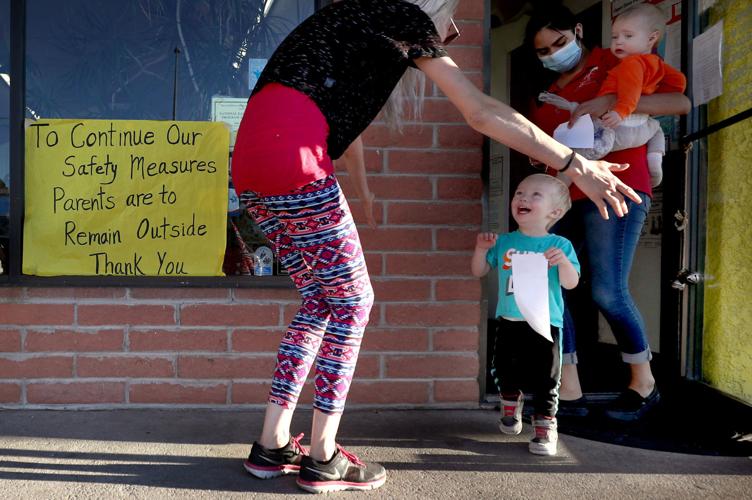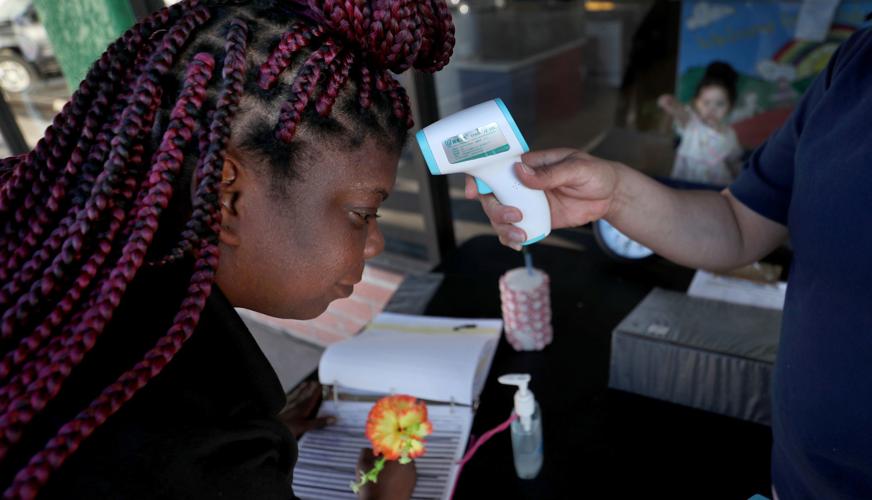opened as a tiny operation in June 2014, building up to an enrollment of more than 80 young children this year.
Then the coronavirus crisis arrived.
тWhen this hit, it was the most exciting time,т said the preschoolтs owner, Ernestina Fuentes, whose passion is helping impoverished children succeed. тIn January and February, we were at capacity for the first time.т
That number quickly dropped from 84 children to five, and the school closed.
тWe were devastated,т Fuentes said, тand we were devastated for our children.т
The COVID-19 pandemic has upended many Pima County preschools and child-care centers, with teachers either out of work or tending to families at high risk of infection while providers who closed wonder if theyтll ever open again.
People are also reading…
Statewide, 1,256 schools and centers for young children have closed. Thatтs nearly half of all УлшжжБВЅтs licensed providers of early childhood care and education, including public and private preschools, facilities, in-home providers and child-care centers.
The hardships interrupted some positive changes for УлшжжБВЅтs working poor families this year, when the state suspended its child-care waiting list after receiving $112 million in federal funds last July. For years leading up to that, many providers had been turning away families that qualified for state assistance because of low reimbursement rates, which hadnтt increased in 18 years.
Gov. Doug Ducey and the stateтs have made several changes in recent weeks to help providers now hurting from the global health crisis, including continuing state reimbursements even if a center is closed or a qualifying child is not attending.
Duceyтs executive order mandates paying providers whatever reimbursements they were receiving in January, and raises half-day payments to full-day payments.
The changes are part of the federal $2 trillion , which allocated $3.5 billion to the existing . Out of that, УлшжжБВЅ received $88 million.
Temperature checks, no new children
In addition to continuing reimbursements for providers, Ducey has used the CARES Act funding for where health-care workers, first responders and other essential employees receive free child care at existing preschools and centers.
As of Thursday, after a week of offering this service, 347 providers had signed up statewide and just under 3,000 children were enrolled.
One of those providers is Jeff Paye, owner of УлшжжБВЅтs Kids First Preschool, 5613 E. Pima St. Typically, the school enrolls 177 children and has a waiting list, but right now about half that number of kids are attending.
Paye, who opened the school with his wife, Pamela, in 2003, said they have made several changes to help keep the children, their families and the schoolтs employees safe, including temperature checks at drop-off and pickup, and not allowing parents in the building.
They are also not accepting new children unless they are from a first-responder, health-care or essential-worker family, he said.
Paye, who applied in time to secure a federal loan, said the school is guaranteeing staff workers 35 hours a week in payment regardless of how much they are working and will push that amount up to 40 hours once the PPP loan arrives.
That federal relief offering is no longer available after the funds, $349 billion, ran out last week. The loans are forgivable for those who utilize the money during the crisis.
тA lot of problemsт
At the time the COVID-19 crisis hit УлшжжБВЅ in March, preschools and child-care centers that receive state subsidies were being polled to see how they were doing with the funding increase from last July.
It was a critical process, after УлшжжБВЅтs families lost 788 providers of subsidized child care between January 2016 and July 31, 2018, including 369 centers and group homes ending their state contracts.
Now, with the current health crisis, itтs unclear how early childhood care in УлшжжБВЅ will look in the months ahead and how people returning to work т especially УлшжжБВЅтs working-poor families т might access care for their children.
Some of the providers who answered the poll said they could not withstand a closure for more than two weeks without getting outside financial support, said Kelley Murphy, director of Early Childhood Policy with the
Some have been able to get federal PPP loans secured, she said, but others were unable to do so before the funding ran out.
тThere were a lot of problems with that particular program in terms of who could apply and who couldnтt,т Murphy said. тSome providers were able to get in but many were not.т
Larger providers that were part of an established network fared better than small mom-and-pop organizations, she said.
The facilities that get 80% to 90% of their payments from DES or are faring best, said Barbie Prinster, director of the .
тMy worry is for those private providers who donтt have any DES contracts, or maybe they have only five or six kids,т she said. тThose are the ones weтre seeing shut their doors and not being sure if they are going to open up again.т
тA lot of us are scramblingт
Amy Baum, director of , said the school decided to close after taking a poll and realizing only a few of their families would still be sending their kids.
тUnfortunately, in the early child-care community, a lot of us are scrambling,т said Baum, who started a coalition of local preschool directors so they could support one another through this time. тItтs a very siloed situation for most centers.т
She said the schools that are open are nowhere near capacity right now.
тThe demand is just not there,т she said. тParents are keeping their kids home unless itтs absolutely necessary.т
Baum said Northminster Christian School is fortunate because it is affiliated with the church, at 2450 E. Fort Lowell Road, and that has offered financial security others lack.
тWe have not been docked anything at this point,т she said. тWeтre lucky ones in this situation.т
Many schools and centers might not be so fortunate, depending on how long the crisis continues.
The estimates that 40% to 60% of the early childhood providers nationwide are not going be around after the health crisis passes.
LaVonne Douville, senior vice president of community development for the , said the United Way is reaching out to providers here to offer what support it can.
тThese people who support us when things are going well, we need to support them when things are not going well,т she said. тThe whole community needs to care. They are the backbone of what makes work work.т
One operation Douville is focused on is Ernestina Fuentesт Herencia Guadalupana preschool, 6855 S. Mark Road.
Fuentes, who has her doctorate in education from helps preschoolers who are living in poverty and would not otherwise have access to a quality preschool experience. About 85% of the children at her school receive DES funding to attend.
They are the ones sheтs focused on as she dreams of reopening.
тWeтll get it going again,т she said. тWeтre resilient.т
Contact reporter Patty Machelor at pmachelor@tucson.com or 806-7754. On Twitter: @pattymachstar















